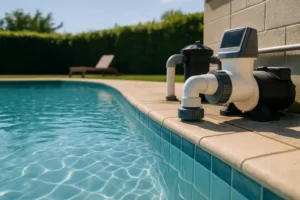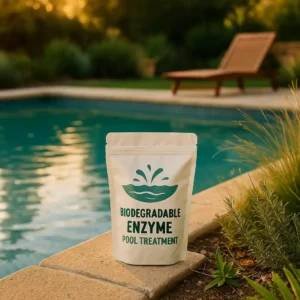I’ll be honest—nobody wakes up on a Saturday excited to wrestle with chlorine buckets and chemical strips. At least I never did. And if you’ve ever stood by your pool, holding your breath because the smell is just too strong, well… you get it.
That’s why more and more people (myself included) are leaning into eco-friendly pool chemistry solutions. We’re talking about stuff that works, but doesn’t burn your eyes or stink up the whole yard. Solutions that feel better, smell better—and yeah, make you feel a little better about what you’re putting into your water.
Especially in places like Texas, where the sun is wild and pool season stretches forever, this shift isn’t just a trend—it’s a kind of quiet rebellion. A lot of us are done with the old way.
 Chlorine Burnout: A Familiar Story
Chlorine Burnout: A Familiar Story
Quick flashback. Saturdays used to be chlorine day at my place. I’d be out there early—testing, measuring, stirring. Goggles on, gloves halfway up my arms. My pool looked okay, sure—but no one really wanted to swim in it. My daughter said it smelled like a lab. My son called it “the itchy water.”
And to be fair… they weren’t wrong.
The turning point came one summer when we tried something different. We installed a saltwater system and added in some enzyme treatments—not fancy or complicated, just different. Within two weeks, it was like the whole vibe changed. The water felt smoother. The smell? Gone.
It wasn’t perfect. But it was better. Way better.
And that’s what I think eco-friendly pool chemistry solutions are really about. Not pretending your pool is now a natural spring—but just making it nicer. Simpler. Less of a chore, and more of a joy.
What Makes a Pool ‘Eco-Friendly’ Anyway?
Okay, so what does that even mean—eco-friendly pool chemistry solutions? For starters, it’s about minimizing the stuff that lingers. The chemicals that sting your nose, irritate your skin, or leave your hair feeling like straw. Going green with your pool means leaning into alternatives that are gentler on people, pets, and the planet.
Here’s what usually changes:
- You reduce harsh synthetic chemicals
- You stop buying tablets and buckets constantly
- You introduce smart systems like saltwater generators and enzyme boosters
- You lower your carbon footprint and chemical runoff
And honestly, it’s also about peace of mind. You stop wondering if your kids should really be swimming in that stuff.
The Saltwater System Breakdown
Now, let’s talk salt. Saltwater pools don’t mean ocean-level salt or no chlorine. It’s a softer, slower, and cleaner way to produce just enough chlorine naturally. The salt generator (sometimes called a chlorinator) converts the salt into chlorine through a process called electrolysis. It cleans your pool without shocking it.
Here’s why it’s awesome:
- No constant chemical dumping
- Way fewer odor problems
- Water feels smoother—almost like rainwater
- Less skin irritation and red eyes
You still have to test your pool, but maintenance becomes more about monitoring than fixing. I check ours once a week, and it’s more out of habit than worry.
The Lowdown on Enzymes
If saltwater is the engine, enzymes are the quiet co-pilots. They’re invisible helpers that break down oils, sweat, lotions, and organic gunk before it becomes a problem. Think of them like probiotics for your pool—balancing things out, naturally.
Enzymes come in liquid form, often derived from plants. They’re biodegradable, safe, and effective. You add them once a week or every other week. They dissolve right into the water and get to work immediately.
I started using them because I was tired of the mysterious white film on the tile line. Haven’t seen it since.
Why Texas Pools Benefit the Most
Texas summers are no joke. The UV rays, the dust, the tree pollen… your pool takes a beating. Traditional chlorine can’t always keep up—it evaporates, it reacts, it smells. But eco-friendly pool chemistry solutions handle that chaos with more grace.
- Salt systems create chlorine consistently, even when the sun’s blazing.
- Enzymes gobble up all that organic matter before algae even thinks about growing.ç
- You don’t have to “shock” your pool every other week just to keep it from turning green.
And with fewer chemicals floating around, your filter doesn’t clog up as fast. Your pump doesn’t strain. Everything just works a little smoother.
 Pros and Cons – No Sales Pitch, Just Real Talk
Pros and Cons – No Sales Pitch, Just Real Talk
Pros:
- Softer water feel
- Better for skin, eyes, hair
- Fewer chemical purchases
- Lower long-term cost
- Safer for families and pets
Cons:
- Higher upfront cost (especially salt systems)
- Enzymes need reapplication
- You still have to test and balance—just less often
Common Brands Worth Checking Out
If you’re shopping around, I’ve had solid experiences with:
- Pentair IntelliChlor (salt system)
- Hayward AquaRite (salt system)
- Natural Chemistry (enzymes)
- Orenda CE-Clarifier (eco-safe clarifier)
Also, Flipr.shop has good recommendations and bundles if you’re looking to build your own green toolkit.
Real Pool, Real People
Last summer, a buddy of mine in San Antonio called me and said, “Dude, I’m done with chlorine. My dog drank the water again.” Two weeks later, he had a salt system installed and started adding enzymes every Sunday. I visited last month—his pool looked like a resort.
The water was clearer. It smelled like nothing. His dog was fine. And his kids? They stayed in until their fingers pruned.
That’s what we’re all after, right?
5 Quick Tips to Make the Switch
- Test your baseline. Know what you’re starting with.
- Start small. Try enzymes first—they’re low-risk, high-reward.
- Plan for salt. Budget for the system. It pays off.
- Adjust slowly. Let your pool adapt week by week.
- Ask questions. Your local pool shop probably knows more than Google.
Here’s the deal. You don’t need to be a chemist to keep your pool clean. You just need the right tools—and maybe a little patience to switch gears.
Eco-friendly pool chemistry solutions make your water feel better, make maintenance easier, and make your conscience a little lighter. They’re not perfect. But in my experience? They’re 100% worth it.
And if you’re also the kind of person who likes keeping tabs on everything from your phone, check out our other piece on Smart Water Monitoring: Sensors and Apps to Control Your Pool. Tech plus nature? That’s the sweet spot.
Your pool deserves it. So do you.
Frequently Askd Questions
1. Is a saltwater pool chlorine-free?
Not quite. It still uses chlorine—it just produces it more gently, and steadily.
2. Can I use enzymes without switching to salt?
Yes! Enzymes work well in any system and can improve chlorine or bromine pools.
3. Will this lower my costs?
Over time, yes. Fewer chemical purchases and less wear on equipment save money.
4. Is it safe for pets?
Generally, yes—but always supervise and rinse your pets after swimming.
5. Can I DIY the switch?
You can for enzymes. For salt systems, it’s better to get a pro to install the generator.
